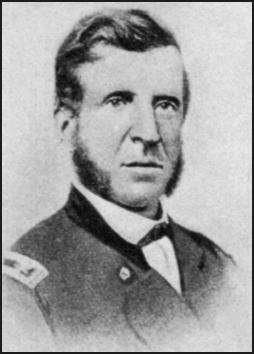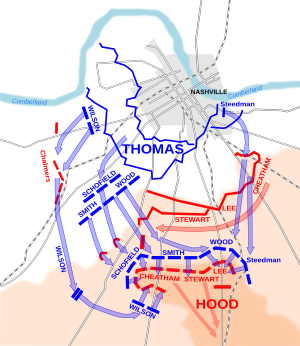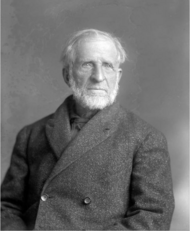Joseph Alexander Cooper facts for kids
Quick facts for kids
Joseph Alexander Cooper
|
|
|---|---|

Joseph Alexander Cooper
|
|
| Born | November 25, 1823 Whitley County, Kentucky, US |
| Died | May 20, 1910 (aged 86) Stafford County, Kansas, US |
| Buried | |
| Allegiance | United States Union |
| Service/ |
United States Army Union Army |
| Years of service | 1847, 1861–66 |
| Rank | |
| Unit | Fourth Tennessee Volunteers 1st Tennessee Infantry |
| Commands held | 6th Tennessee Infantry 1st Bde, 2nd Div, XXIII Corps 2nd Division, XXIII Corps |
| Battles/wars | Mexican–American War American Civil War • Mill Springs (1862) • Stones River (1862–3) • Chickamauga (1863) • Knoxville Campaign (1863) • Resaca (1864) • Jonesborough (1864) • Nashville (1864) • Bentonville (1865) |
| Other work | Tennessee State Guard commander, politician, farmer |
Joseph Alexander Cooper (born November 25, 1823 – died May 20, 1910) was an American farmer, soldier, and public servant. He was a Southern Unionist, meaning he was from the South but supported the Union during the American Civil War. He fought for the Union Army and led troops in important battles like Mill Springs, Stones River, and Nashville. By the time he left the army in 1866, he had reached the rank of Brevet Major General.
After the war, Cooper led the Tennessee State Guard. This was a state army created by Governor William G. Brownlow to help stop violence in Tennessee. Later, in the 1870s, he worked as a tax agent. He then moved to Kansas, where he lived for the rest of his life.
Contents
Early Life and Beginnings
Joseph Cooper was born on a farm in Whitley County, Kentucky, on November 25, 1823. His father, John Cooper, had fought in the War of 1812. When Joseph was a baby, his family moved to Campbell County, Tennessee. They settled on a farm near a place called Cove Creek.
As a young man, Cooper became a church leader (a deacon) in 1839. In April 1846, he married Mary J. Hutson.
Serving in the Mexican-American War
During the Mexican–American War, Cooper joined the army as a private in September 1847. He served in the 4th Tennessee Infantry. He spent several months in Mexico City before leaving the army in August 1848. After the war, he returned to his farm in Campbell County. He worked hard, and his farm grew bigger between 1850 and 1860.
Political Involvement Before the Civil War
Before the Civil War, Cooper became more active in politics. He was part of the Whig Party, which was a major political group at the time. In the 1860 presidential election, he supported John Bell, who was a candidate for the Constitutional Union Party.
Cooper also attended meetings of the East Tennessee Convention. This group wanted to create a new state in East Tennessee that would stay loyal to the Union. He represented Campbell County at these meetings. He first supported strong actions to keep East Tennessee with the Union. But he later agreed with a more peaceful approach.
Civil War Service
While at the East Tennessee Convention, Cooper and other leaders secretly agreed to go home and start training men. Their goal was to defend their region from Confederate forces. Cooper went back to Campbell County and began gathering Union supporters. He farmed during the day and recruited soldiers at night. By August, he had gathered over 500 men. He trained them in a hidden meadow near Jacksboro.
Joining the Union Army
When Confederate soldiers approached, Cooper and his new unit went to Kentucky. On August 4, 1861, he officially joined the Union Army as a captain. His unit was Company A of the 1st Tennessee Infantry. He took part in actions around Cumberland Gap and fought in the Battle of Mills Springs in January 1862.
In March 1862, Cooper's company broke through Confederate defenses at Big Creek Gap. This was an important mountain pass in northern Campbell County. In May 1862, Cooper was promoted to colonel. He was given command of the 6th Tennessee Infantry, a unit he helped organize. In July 1862, Cooper and his regiment attacked Confederate forces at Wallace's Crossroads, capturing several soldiers.
Key Battles and Promotions
In late September 1862, Cooper and Union forces moved north to the Ohio River to regroup. In December 1862, he joined Union forces in Nashville. During the Battle of Stones River in January 1863, Cooper's unit helped protect a supply train. They stopped an attempt by Confederate General Joseph Wheeler to capture the supplies.
In September 1863, Cooper fought Confederate forces near Lookout Mountain during the Battle of Chickamauga. He also took part in the Knoxville Campaign in late 1863 and early 1864. In April 1864, Cooper led a brigade (a large group of soldiers) at the Battle of Resaca in Georgia. His unit had many casualties there. After this, he joined General William T. Sherman's Atlanta Campaign.
Cooper was promoted to brigadier general on July 30, 1864. He commanded a brigade in the XXIII Corps. At the Battle of Utoy Creek on August 6, 1864, he led two brigades in a successful attack. He even took temporary command of a larger division after the Battle of Jonesborough.
During the Franklin-Nashville Campaign, Cooper again commanded his brigade and sometimes the 2nd Division. In November 1864, he marched to help Nashville, which was being threatened by Confederate General John B. Hood. Cooper's troops marched over 150 miles (240 km) in six days. When they reached Nashville, he helped stop Hood's attack. His troops charged and captured two enemy cannons and many Confederate soldiers.
In January 1865, Cooper led the 2nd Division to North Carolina. There, he fought in the Battle of Bentonville. In March 1865, he was given the honorary rank of brevet major general for his excellent service throughout the war, especially at Nashville. He officially left the army on January 15, 1866.
Tennessee State Guard
After the war, Cooper moved to Knox County and became involved in politics. There was a disagreement between Governor William "Parson" Brownlow and President Andrew Johnson. They disagreed on how to treat formerly enslaved people and former Confederates. Cooper supported Governor Brownlow, who wanted to give civil rights to former slaves and prevent ex-Confederates from voting.
In August 1865, Cooper ran for a seat in Congress. He came in second place. He later turned down offers to run for the state legislature.
Leading the State Guard
Governor Brownlow's strict policies towards former Confederates caused problems. Groups like the Ku Klux Klan caused violence across the state. Brownlow asked the federal army for help, but they didn't want to get involved. To stop the violence, Brownlow created a new state army called the Tennessee State Guard in January 1867. On June 7, 1867, Brownlow appointed Cooper as the commander of the State Guard.
Cooper quickly organized the Guard. He divided its 1,900 recruits into two regiments. Many of the company leaders were former Union Army officers. The Guard also included African American soldiers. Cooper made sure the Guard had enough supplies. Twenty-one companies were sent to troubled areas across the state. One week before the August 1867 elections, Cooper announced the Guard was ready.
Governor Brownlow easily won the election. Some people criticized the State Guard, saying they used strong methods to ensure order. Nashville's mayor, William Matt Brown, was a strong critic. He said the State Guard couldn't control city elections. In response, Cooper sent State Guardsmen to the city, and the mayor eventually gave in. By the end of September, most Guardsmen had left the service. Cooper stepped down from command on October 11, saying the Klan threat was under control.
Second Command of the State Guard
In January 1869, Governor Brownlow reactivated the State Guard because of another rise in Klan violence. He reappointed Cooper as commander. Brownlow declared martial law (military rule) in nine Tennessee counties. Cooper said that any Klansmen caught would be punished. He also warned local leaders that martial law would be put in place if they didn't help fight the Klan.
However, in late February 1869, Brownlow's successor, Dewitt Clinton Senter, eased the martial law. He then began to reduce the size of the Guard. Cooper left his command for the second time on May 22, 1869.
Some historians from the late 1800s criticized the State Guard. They saw it as a tool of unfair rule. But more recent historians, like Ben H. Severance, argue that the State Guard actually helped protect the rights of formerly enslaved people and the rebuilding process after the war.
Later Life and Legacy
In October 1867, Cooper was considered for a U.S. Senate seat, but Governor Brownlow was chosen instead. In May 1869, Cooper attended a political meeting that became very heated. When several people started fighting over who would lead the meeting, Cooper stepped in. He calmed everyone down and convinced them to take a break. He famously told them, "Go, and drink less bad whiskey and you will be more capable of doing business."
Later that year, President Ulysses S. Grant appointed Cooper as a tax collector for the Knoxville area. He held this job until 1879.
In 1880, Cooper moved to Stafford County, Kansas. There, he became a farmer and supported local politicians. Soon after arriving, he was chosen to lead the South Central Baptist Association of Kansas, a position he held until 1909. On April 3, 1891, he was hurt in Larned when he was hit by a train car, but he recovered.
Joseph Alexander Cooper died at his home near St. John on May 20, 1910. His body was returned to Knoxville, Tennessee, where he was buried in the Knoxville National Cemetery.
See also
 | Ernest Everett Just |
 | Mary Jackson |
 | Emmett Chappelle |
 | Marie Maynard Daly |



